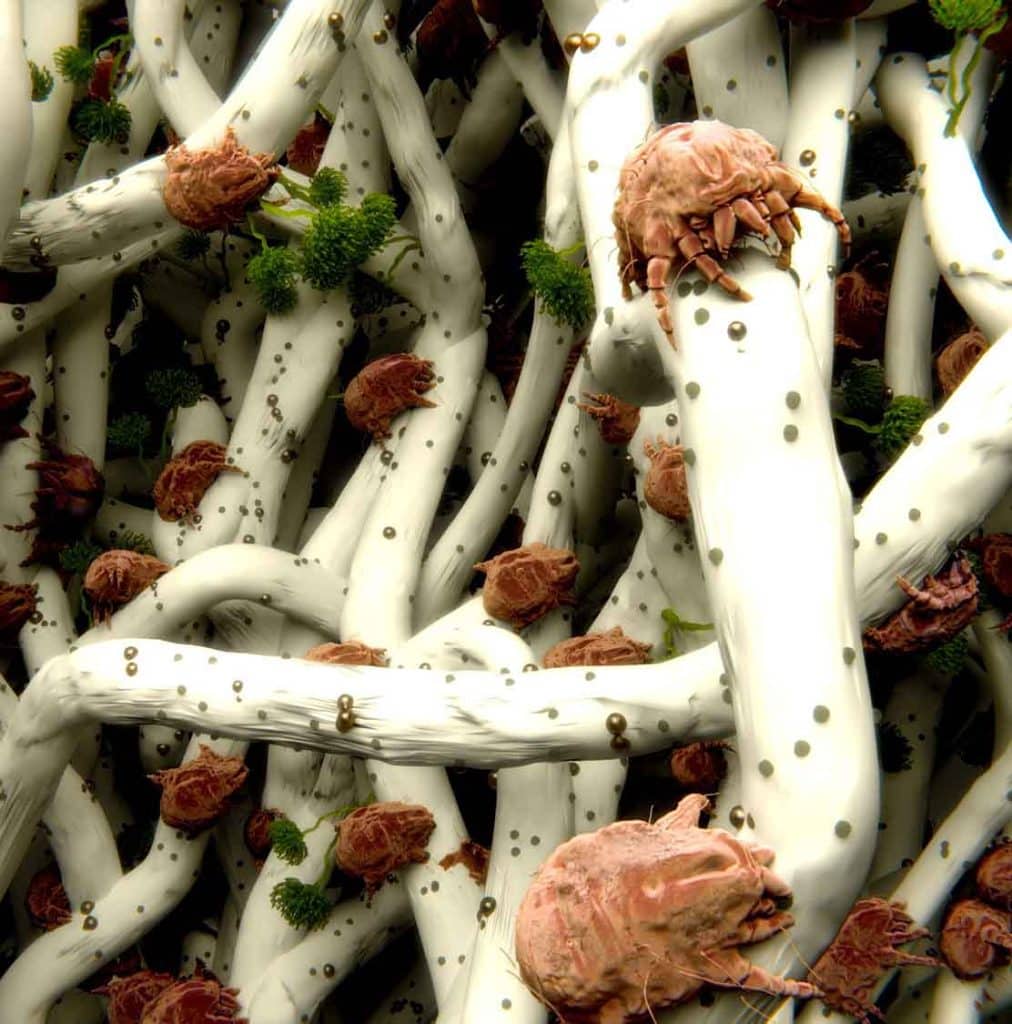There are thousands of species in the U.S., so you may have encountered these bugs at some point. If you’ve noticed mysterious bug bites, you could have mites in your home or yard.
You’ve likely heard the term “mite” before, maybe a dust mite, but you may not be sure what a mite is. They often get blamed for a lot of mysterious itching and bug bites, mainly because they are so tiny and hard to spot.
If you suspect mites in your home, contact Titan Pest & Wildlife for a free estimate. Upon inspection, we can determine what type of mites you’re up against and suggest a treatment plan that fits your needs and budget.

What Do Mites Look Like?
Mites are microscopic arthropods that look similar to ticks. They are troublesome pests because most mites cannot be seen with the naked eye. They are classified as arachnids because they have eight jointed legs. They vary in size depending on their species. The only way you can tell you have mites is by noticing the signs of an infestation.
Diet and Habitat
The United States is home to thousands of species of mites, including clover mites, bird mites, dust mites, chiggers, grain mites, flour mites, and itch mites. Most are invisible to the naked eye.
They live in nearly every type of habitat, including deep soil. They frequently live as parasites on animals, birds, and insects. They often spread wherever their host animal travels. Mites like chiggers and scabies mites bury themselves under human skin. Household mites, like dust mites, feed on dead skin flakes. But others bite animals and sometimes humans to suck their blood.
Signs of Mites
The best way to determine the type of mites you have is to discuss the signs and symptoms of the most common mites.
- Chiggers – Adult chiggers feed on decaying material in the soil. However, their larvae feed on the skin cells of living hosts. When one attaches to a person’s skin, it secretes a digestive enzyme irritating it. Chigger bites create small clusters of small red bumps on the skin that cause intense itching. The symptoms can last a few days to a couple of weeks.
- Scabies – Scabies is a skin condition caused by an infestation of Sarcoptes scabiei mites. They are contagious as they quickly pass between people through direct skin contact. An infestation can lead to an itchy, red skin rash and intense itching. The rash may contain tiny bumps, hives, or welts under the skin. Scratching the affected skin can lead to open sores and increase a person’s risk of infection.
- Dust mites – They are called dust mites because they inhabit house dust. They feed on dead skin and dander that falls off humans and pets. They live in mattresses, furniture, carpets, rugs, bedding, and other areas that trap dust. While they do not live on or bite humans, they produce proteins in their exoskeletons and feces that induce allergic reactions in people. The Asthma and Allergy Foundation of America (AAFA) warns that dust mites can exacerbate a person’s asthma.
- Flour and grain mites – Grain mites are pests that can feed on various processed or finely ground grains, wheat germ, yeast, cheese, powdered milk, flour, or mold spores. Under hot, humid conditions, vast populations of these tiny creatures can develop rapidly. These creatures are so small the first sign you’ll notice is typically the dust-like residue they leave behind, which you might mistake for moving lint. Food infested with grain mites may also give off a minty smell.
How to Get Rid of Mites
Titan Pest & Wildlife is trained to help manage mites and similar pests. Since every home is different, our professional exterminators will design a unique mite treatment program for your situation and budget. Contact us today to request a free estimate.

